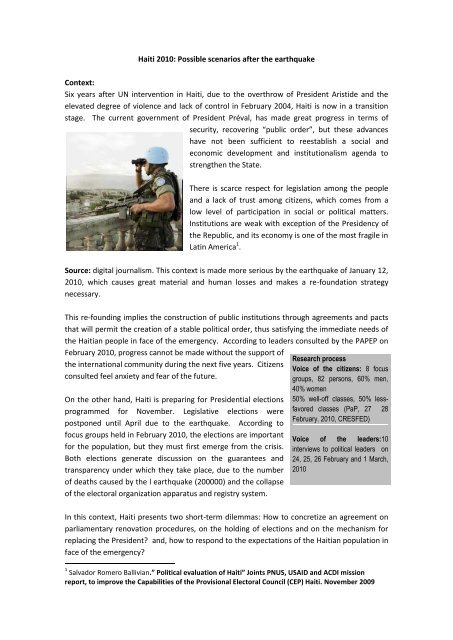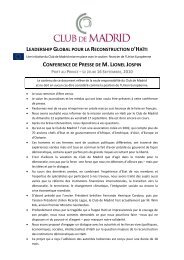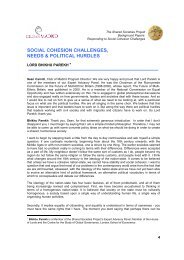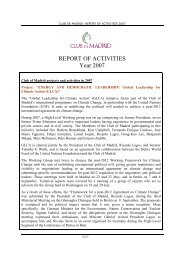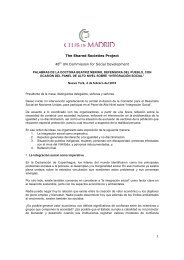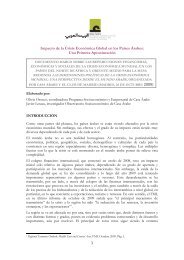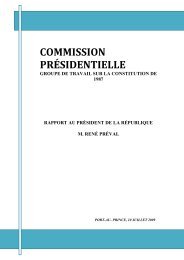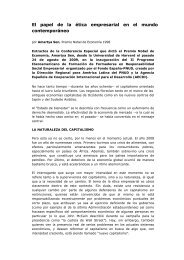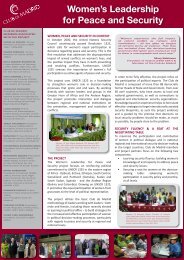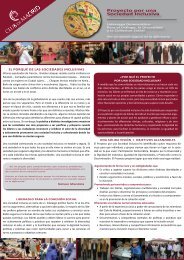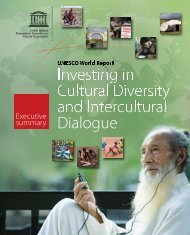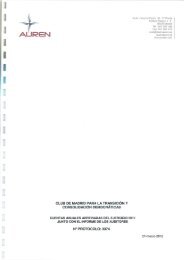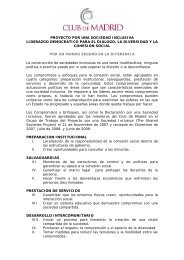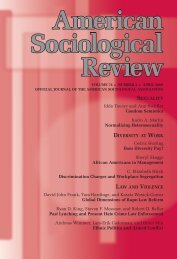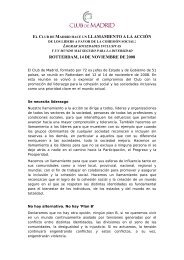Haiti 2010: Possible scenarios after the earthquake ... - Club of Madrid
Haiti 2010: Possible scenarios after the earthquake ... - Club of Madrid
Haiti 2010: Possible scenarios after the earthquake ... - Club of Madrid
You also want an ePaper? Increase the reach of your titles
YUMPU automatically turns print PDFs into web optimized ePapers that Google loves.
<strong>Haiti</strong> <strong>2010</strong>: <strong>Possible</strong> <strong>scenarios</strong> <strong>after</strong> <strong>the</strong> <strong>earthquake</strong><br />
Context:<br />
Six years <strong>after</strong> UN intervention in <strong>Haiti</strong>, due to <strong>the</strong> overthrow <strong>of</strong> President Aristide and <strong>the</strong><br />
elevated degree <strong>of</strong> violence and lack <strong>of</strong> control in February 2004, <strong>Haiti</strong> is now in a transition<br />
stage. The current government <strong>of</strong> President Préval, has made great progress in terms <strong>of</strong><br />
security, recovering “public order”, but <strong>the</strong>se advances<br />
have not been sufficient to reestablish a social and<br />
economic development and institutionalism agenda to<br />
streng<strong>the</strong>n <strong>the</strong> State.<br />
There is scarce respect for legislation among <strong>the</strong> people<br />
and a lack <strong>of</strong> trust among citizens, which comes from a<br />
low level <strong>of</strong> participation in social or political matters.<br />
Institutions are weak with exception <strong>of</strong> <strong>the</strong> Presidency <strong>of</strong><br />
<strong>the</strong> Republic, and its economy is one <strong>of</strong> <strong>the</strong> most fragile in<br />
Latin America 1 .<br />
Source: digital journalism. This context is made more serious by <strong>the</strong> <strong>earthquake</strong> <strong>of</strong> January 12,<br />
<strong>2010</strong>, which causes great material and human losses and makes a re-foundation strategy<br />
necessary.<br />
This re-founding implies <strong>the</strong> construction <strong>of</strong> public institutions through agreements and pacts<br />
that will permit <strong>the</strong> creation <strong>of</strong> a stable political order, thus satisfying <strong>the</strong> immediate needs <strong>of</strong><br />
<strong>the</strong> <strong>Haiti</strong>an people in face <strong>of</strong> <strong>the</strong> emergency. According to leaders consulted by <strong>the</strong> PAPEP on<br />
February <strong>2010</strong>, progress cannot be made without <strong>the</strong> support <strong>of</strong><br />
<strong>the</strong> international community during <strong>the</strong> next five years. Citizens<br />
consulted feel anxiety and fear <strong>of</strong> <strong>the</strong> future.<br />
On <strong>the</strong> o<strong>the</strong>r hand, <strong>Haiti</strong> is preparing for Presidential elections<br />
programmed for November. Legislative elections were<br />
postponed until April due to <strong>the</strong> <strong>earthquake</strong>. According to<br />
focus groups held in February <strong>2010</strong>, <strong>the</strong> elections are important<br />
for <strong>the</strong> population, but <strong>the</strong>y must first emerge from <strong>the</strong> crisis.<br />
Both elections generate discussion on <strong>the</strong> guarantees and<br />
transparency under which <strong>the</strong>y take place, due to <strong>the</strong> number<br />
<strong>of</strong> deaths caused by <strong>the</strong> l <strong>earthquake</strong> (200000) and <strong>the</strong> collapse<br />
<strong>of</strong> <strong>the</strong> electoral organization apparatus and registry system.<br />
Research process<br />
Voice <strong>of</strong> <strong>the</strong> citizens: 8 focus<br />
groups, 82 persons, 60% men,<br />
40% women<br />
50% well-<strong>of</strong>f classes, 50% lessfavored<br />
classes (PaP, 27 28<br />
February. <strong>2010</strong>, CRESFED)<br />
Voice <strong>of</strong> <strong>the</strong> leaders:10<br />
interviews to political leaders on<br />
24, 25, 26 February and 1 March,<br />
<strong>2010</strong><br />
In this context, <strong>Haiti</strong> presents two short-term dilemmas: How to concretize an agreement on<br />
parliamentary renovation procedures, on <strong>the</strong> holding <strong>of</strong> elections and on <strong>the</strong> mechanism for<br />
replacing <strong>the</strong> President? and, how to respond to <strong>the</strong> expectations <strong>of</strong> <strong>the</strong> <strong>Haiti</strong>an population in<br />
face <strong>of</strong> <strong>the</strong> emergency?<br />
1 Salvador Romero Ballivian.” Political evaluation <strong>of</strong> <strong>Haiti</strong>” Joints PNUS, USAID and ACDI mission<br />
report, to improve <strong>the</strong> Capabilities <strong>of</strong> <strong>the</strong> Provisional Electoral Council (CEP) <strong>Haiti</strong>. November 2009
Scenarios<br />
<strong>Haiti</strong> Scenarios <strong>2010</strong>-2011<br />
Scenario 1: “The stalemate” In this scenario, <strong>the</strong> implicit agreement <strong>of</strong><br />
doing nothing prevails among political actors. Parliament’s mandate is not<br />
renewed and constitutional reform is abandoned. There is <strong>the</strong> presence<br />
<strong>of</strong> an enfeebled President who governs with difficulty by means <strong>of</strong><br />
Decrees in a political polarization context. There is restructuring <strong>of</strong> <strong>the</strong><br />
Government and partial inclusion <strong>of</strong> certain opposition parties. The<br />
appropriation <strong>of</strong> <strong>the</strong> aid administration by certain political parties is<br />
observed, especially with <strong>the</strong> proximity <strong>of</strong> elections. Civil society<br />
participation is not fostered. The private sector manages to partially add<br />
Critical Variables:<br />
dynamism to <strong>the</strong> economy, but is obliged to do short-term planning in view <strong>of</strong> <strong>the</strong> uncertain<br />
context. The immediate needs <strong>of</strong> <strong>the</strong> population are partially satisfied but a political horizon is<br />
not built. A feeling <strong>of</strong> resignation prevails among <strong>Haiti</strong>ans.<br />
General elections take place in a context <strong>of</strong> boycott by political parties, amid <strong>the</strong> indifference<br />
<strong>of</strong> <strong>the</strong> population, with great technical difficulties and serious risks <strong>of</strong> political violence. A<br />
weak, barely legitimate government wins, with greater difficulties for facing reconstruction<br />
challenges.<br />
<br />
<br />
Political<br />
agreement<br />
Response<br />
capability in face<br />
<strong>of</strong><br />
<strong>the</strong><br />
emergency<br />
Scenario 2: “Chaos” In this scenario, violent disturbances due to a struggle for power prevails.<br />
The main political actors attempt to impose <strong>the</strong>ir own visions with respect to <strong>the</strong> political and<br />
institutional model that should prevail in <strong>the</strong> reconstruction period, and become incapable <strong>of</strong><br />
agreeing on parliament renovation procedures, holding <strong>of</strong> elections and on <strong>the</strong> mechanism for<br />
replacing <strong>the</strong> President. No consensus is reached on <strong>the</strong> stability <strong>of</strong> political institutions<br />
(political order). Diverse strategies are implemented to destabilize <strong>the</strong> government. An<br />
absence <strong>of</strong> basic services is generated. The intensity <strong>of</strong> <strong>the</strong> inclement wea<strong>the</strong>r and <strong>the</strong><br />
difficulty <strong>of</strong> guaranteeing <strong>the</strong> agricultural cycle make <strong>the</strong> situation <strong>of</strong> <strong>the</strong> population even more<br />
precarious. The feeling <strong>of</strong> resignation is transformed into anger, coming to a social explosion.
We observe violent disturbances on a background <strong>of</strong> political fragmentation and absence <strong>of</strong><br />
collective horizons. The President can be forced to leave power before <strong>the</strong> end <strong>of</strong> his mandate.<br />
A stronger presence <strong>of</strong> <strong>the</strong> international community can be seen, whose intervention is<br />
decisive for <strong>the</strong> reestablishment <strong>of</strong> order, <strong>the</strong> installation <strong>of</strong> a new political climate, and <strong>the</strong><br />
management <strong>of</strong> <strong>the</strong> transition to arrive at <strong>the</strong> swearing-in <strong>of</strong> new <strong>of</strong>ficials in charge <strong>of</strong> leading<br />
<strong>the</strong> country.<br />
Scenario 3: “The phoenix” In this scenario, <strong>the</strong>re is <strong>the</strong> presence <strong>of</strong> a strong President who<br />
enjoys strong support from ample sectors <strong>of</strong> <strong>the</strong> population, whose immediate needs are<br />
satisfied since <strong>the</strong>y find echo in presidential messages and actions, which generates hope. The<br />
government is restructures with <strong>the</strong> objective <strong>of</strong> orienting its action toward coordination <strong>of</strong> aid<br />
and execution <strong>of</strong> actions prioritized by <strong>the</strong> President, in an alliance with <strong>the</strong> private sector that<br />
generates pr<strong>of</strong>its in a context <strong>of</strong> political stability. Parliament, now dysfunctional, is put aside.<br />
The President governs by Decree. Political opposition cannot impugn <strong>the</strong> government’s<br />
actions. The President can also achieve <strong>the</strong> construction <strong>of</strong> an institutional space, in which he<br />
has an ample majority which provides him with governance instruments. Since <strong>the</strong> new power<br />
scheme allows guaranteeing political stability and <strong>the</strong> beginning <strong>of</strong> <strong>the</strong> country’s<br />
reconstruction, presidential elections pass slowly to a second plane. This opens <strong>the</strong> possibility<br />
<strong>of</strong> an eventual leng<strong>the</strong>ning <strong>of</strong> his mandate, and in <strong>the</strong> medium-term, <strong>the</strong> installation <strong>of</strong> a nondemocratic<br />
order.<br />
Scenario 4: “Commitment” In this scenario, <strong>the</strong> principal actors agree on <strong>the</strong> manner <strong>of</strong><br />
managing immediate constitutional terms in a progressive period that would allow <strong>the</strong><br />
construction <strong>of</strong> a minimum trust basis. The basic agreement attempts to:<br />
i) Filling <strong>the</strong> Parliamentary void ii) Defining <strong>the</strong> immediate future <strong>of</strong> <strong>the</strong> constitutional reform<br />
iii) Defining <strong>the</strong> conditions for holding presidential elections iv) Defining criteria for aid<br />
management, so as to satisfy <strong>the</strong> needs <strong>of</strong> <strong>the</strong> population and give it new reasons for hope.<br />
The minimum political agreement on procedures creates an environment <strong>of</strong> stability that will<br />
allow avoiding <strong>the</strong> worst scenario. During <strong>the</strong> following months, all <strong>the</strong> active forces <strong>of</strong> <strong>the</strong><br />
country toge<strong>the</strong>r with <strong>the</strong> support <strong>of</strong> <strong>the</strong> international community move forward to a socialpolitical<br />
pact for <strong>the</strong> “re-founding <strong>of</strong> <strong>Haiti</strong>” prioritizing long-term development.<br />
The <strong>earthquake</strong> has a long-term effect on <strong>the</strong> population that recovers hope and participates<br />
in debates on <strong>the</strong> future <strong>of</strong> <strong>the</strong> country. One can observe <strong>the</strong> emergence <strong>of</strong> a <strong>Haiti</strong>an society<br />
based on solidarity and inclusion, and <strong>the</strong> emergence <strong>of</strong> a new democratic political order.<br />
To arrive at Scenario 4, “Commitment”, political leaders must take into account <strong>the</strong> following<br />
points:<br />
<br />
Leave <strong>the</strong> prisoner scheme: Create an informal very low pr<strong>of</strong>ile discussion venue with<br />
privileged groups <strong>of</strong> <strong>Haiti</strong>an personalities.<br />
<br />
Build a vision <strong>of</strong> <strong>the</strong> future: Carry out a collective reflection and public debate process on<br />
<strong>the</strong> re-founding <strong>of</strong> <strong>the</strong> country that would allow
Living toge<strong>the</strong>r: Prioritize a reconstruction and recovery program <strong>of</strong> public spaces (parks,<br />
sports, recreational, social and cultural activities.<br />
Impact<br />
Corollary<br />
Seven months <strong>after</strong> <strong>the</strong> <strong>earthquake</strong>, President Préval published, on July 1, <strong>the</strong> Presidential<br />
Decrees that see presidential and legislative elections for November 28. Last August 7, ended<br />
<strong>the</strong> period for registration <strong>of</strong> presidential candidates with 34 candidates registered to <strong>the</strong><br />
presidency <strong>of</strong> <strong>Haiti</strong> in coming elections.<br />
As to <strong>the</strong> humanitarian situation, UN agencies and o<strong>the</strong>r international organizations prepared<br />
a balance <strong>of</strong> <strong>the</strong> humanitarian situation in <strong>Haiti</strong>, six moths <strong>after</strong> <strong>the</strong> quake. The balance by<br />
international organizations is positive in general, but <strong>the</strong>y express concern with respect to<br />
<strong>Haiti</strong>’s short-term challenges. According to a source <strong>of</strong> Jesuit Refugee Services in Latin America<br />
and <strong>the</strong> Caribbean, <strong>the</strong> Doctors Without Borders organization mentions in its report<br />
“Emergency response <strong>after</strong> <strong>the</strong> Earthquake in <strong>Haiti</strong>, that <strong>the</strong>ir teams “see frustration and anger<br />
grow (in <strong>the</strong> population) since <strong>the</strong>ir living conditions have not changed since <strong>the</strong> <strong>earthquake</strong>”.<br />
On <strong>the</strong> o<strong>the</strong>r hand <strong>the</strong> Collective “Haïti Lavi 12-12” integrated by <strong>the</strong> organizations Caritas<br />
International, Doctors <strong>of</strong> <strong>the</strong> World, Oxfam-Solidarité and UNICEF Belgium, point to <strong>the</strong> urgent<br />
need <strong>of</strong> reinforcing <strong>the</strong> health sector in <strong>Haiti</strong> and <strong>of</strong> keeping up food aid to <strong>the</strong> affected, since<br />
natural phenomena could cause considerable damages to <strong>the</strong> agricultural harvests.<br />
In general terms, relevant international organizations to date note that “all <strong>the</strong> ills that were<br />
prognosticated for <strong>the</strong> country <strong>after</strong> <strong>the</strong> <strong>earthquake</strong>” did not happen, such as epidemics,<br />
generalized humanitarian crises, great crime and violence waves, chaos”… They give most <strong>of</strong><br />
<strong>the</strong> credit to <strong>the</strong> same <strong>Haiti</strong>ans who with <strong>the</strong>ir dignity, discipline and sense <strong>of</strong> solidarity were<br />
<strong>the</strong> first to help <strong>the</strong> wounded and who continue to organize and work to answer to <strong>the</strong>ir own<br />
needs”.


